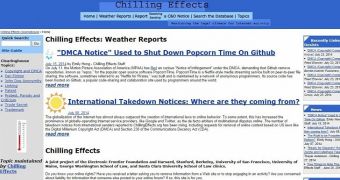Google is struggling to keep things transparent when it comes to DMCA notices and they’re not really making things pleasant for rights owners, it seems.
For many years now, Google has been handling a growing number of DMCA requests. Along with the influx of takedown requests, Google has also been getting more and more annoyed comments from those whose voices it listens to.
That’s because the company tries to be as transparent about the DMCA process as possible, much like it does with anything else that regards data requests or takedowns. For instance, one of the things you’ll notice while googling for various things are the notices that some links had been removed from the page under the DMCA laws.
While this may not be that bad, it is the link Google attaches to the note that gets rights holders annoyed. The inclusion of a link to the Chilling Effects site which includes a copy of the DMCA notice, complete with the full link to the infringing content, is what’s getting Google into trouble these days.
As TorrentFreak points out, Chilling Effects has been around since 2001 as a way for activists to keep track of the increasing volume of cease-and-desist letters that have a “chilling effect” on free speech.
In the passing years, Google has taken on to forwarding the DMCA requests it receives over to the archive, along with many other companies, including Twitter.
Furthermore, when copyright holders have taken on to demand that Google remove links leading to Chilling Effects, Google simply ignored them time and time again, putting freedom of speech over people’s desire to bury the last traces of an infringing link.
HBO, for instance, tried to take down the site on 240 occasions, while DMM.com Labo tried to de-index 184 links. Microsoft follows next, with 99 requests, and NBC Universal with 65.
The issue with these demands is tricky because while the links towards Chilling Effects and the archive itself may hold links towards infringing content, they don’t actually hold said content, therefore they can’t be treated like a pirate index, but rather as an educational and research resource.
The annoyed copyright holders should perhaps learn that Google doesn’t police the Internet, and just because a link has been removed from its index, it doesn’t mean that it completely vanishes from the Internet. While the link may vanish from the search results, it continues to live on the actual sites and if someone really wants to pirate specific content, they will find a way to get to it, regardless of whether Google displays an easy way to it or not.
Google is in yet another similar situation with European officials, who want the search giant to stop telling the world when links have been removed under the Right to Be Forgotten ruling to hide some people’s desire to hide information about them.

 14 DAY TRIAL //
14 DAY TRIAL //